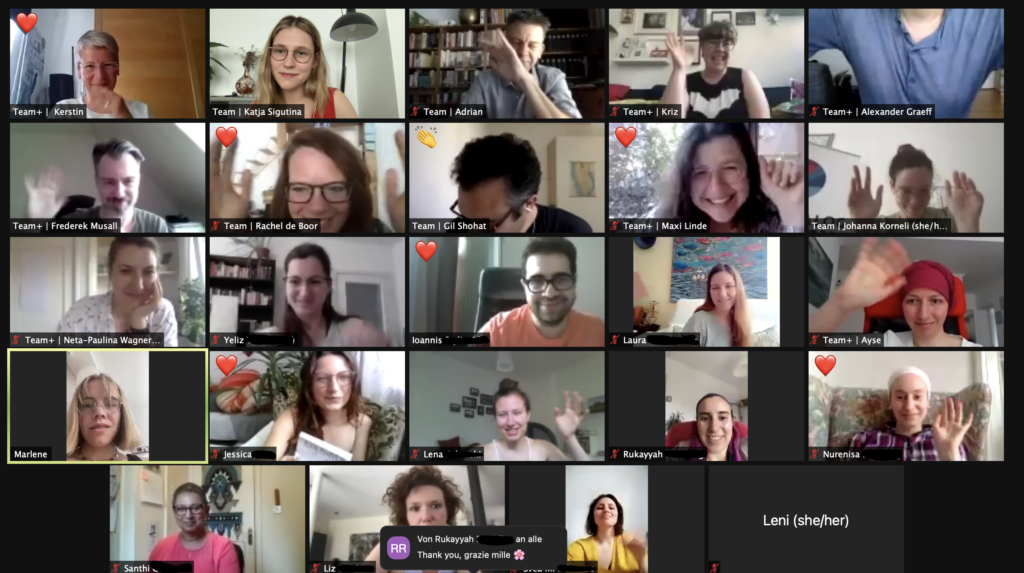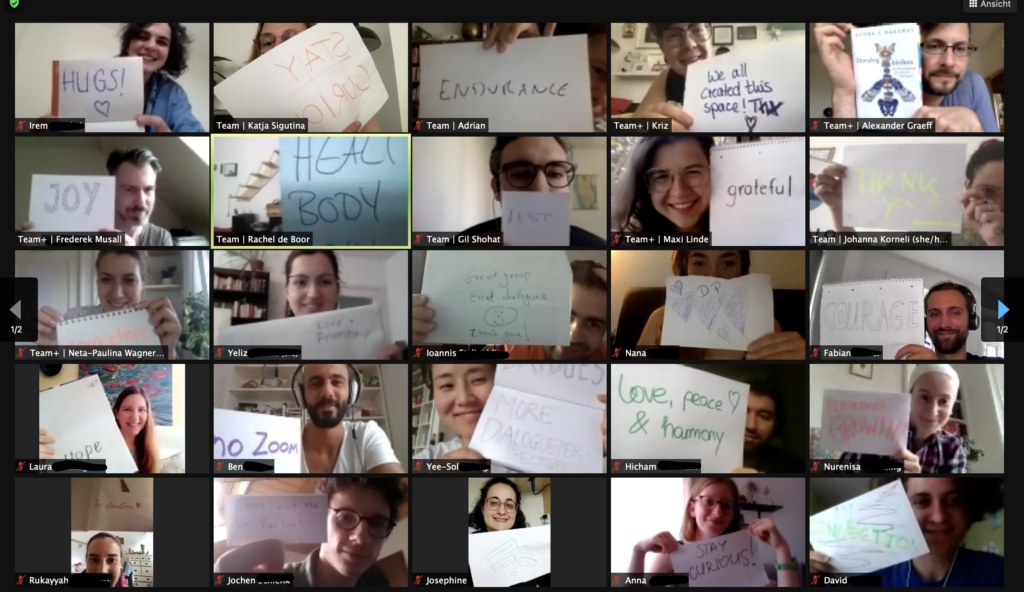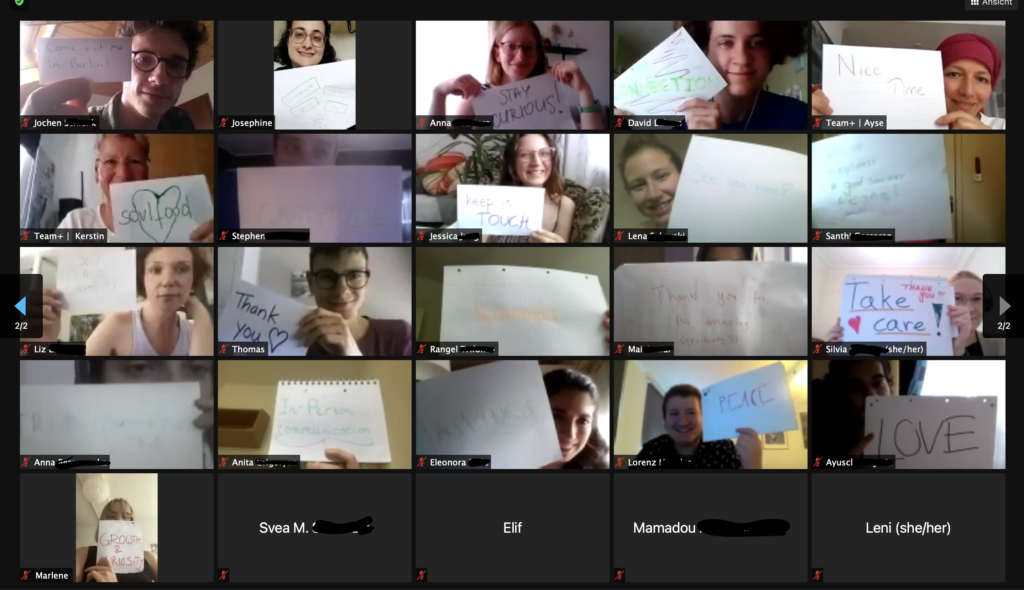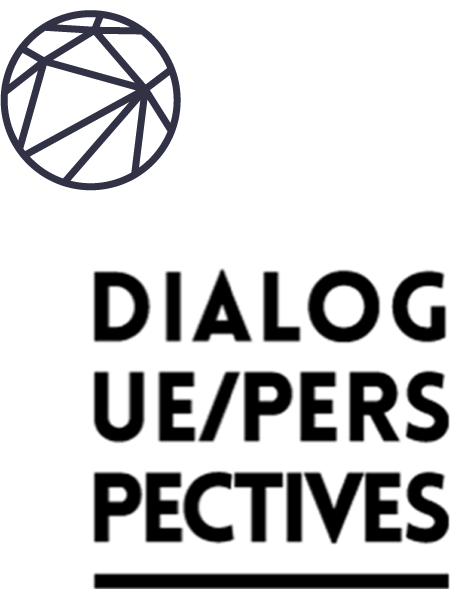Retrospect: International Conference 2021
Participants of the 2020/21 cohort end the programme year with intense reflections, debate and encounters
Our 2020/21 DialoguePerspectives programme year, the first one as a European project funded by the Federal Foreign Office, came to an end with our International Conference (17-20 June). The Conference, as was the Spring Seminar, was held in the digital realm, but nevertheless offered space for reflection, discussion, networking and trustful exchange. Over the course of three da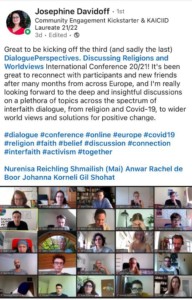 ys, our participants deepened the bonds that were struck since last October – many of them wishing to continue their journey with DialoguePerspectives in the next programme year.
ys, our participants deepened the bonds that were struck since last October – many of them wishing to continue their journey with DialoguePerspectives in the next programme year.
The opening session (17 June) started with a welcome address by Michael Roth, Minister of State for Europe at the Federal Foreign Office. Roth emphasized the importance of our work at the confluence of religions, worldviews and societal issues and congratulated the participants for continuing their commitment despite the difficulties pertaining to the coronavirus pandemic. After some introductory remarks by programme leader Johanna Korneli and programme managers Rachel de Boor and Gil Shohat, the participants listened to an input by Jo Frank, Director of Development of the Leo Baeck Foundation. In his input, he stated the need for a transfer of the demands and ideas developed in the DialoguePerspectives-realm into the political sphere – a project that is currently under way in form of the European Leadership Workshop that was initiated in this programme year.
The afternoon was spent in breakout rooms, where members of the DialoguePerspectives extended team (Kristina Schneider, Alexander Graeff, Frederek Musall, Maximiliane Linde and Neta-Paulina Wagner) as well as Rachel de Boor headed virtual ‘world café’ tables, dealing with critical issues of interreligious and worldview dialogue. Topics discussed with the participants where, for instance, “attitudes, abilities and competences needed for dialogue” or “interreligious-worldview diversity and voices of minorities”. One of the read threads structuring the world café (and the w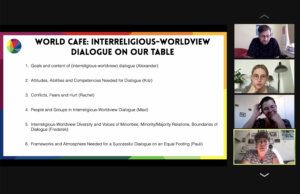 ork of DialoguePerspectives in general) was the discussion on the boundaries of criticism in interreligious/worldview dialogue – when does harsh criticism become disrespectful and insulting and where can we maintain an open, controversial and yet empathetic discussion despite of deep sitting differences?
ork of DialoguePerspectives in general) was the discussion on the boundaries of criticism in interreligious/worldview dialogue – when does harsh criticism become disrespectful and insulting and where can we maintain an open, controversial and yet empathetic discussion despite of deep sitting differences?
In the evening session, the stage was fully the participants: Svea Schnaars, Santhi Corcoran, David Bakum, Nana Tigges, Ioannis Stylianidis, Nurenisa Reichling and Jessica Jung offered input sessions on their current topics of interest, for instance the relevance of worldview dialogue for non-religious participants or the role of mental health in an interreligious/worldview setting. This session was an impressive example of the breadth of our participants expertise and a reflection of the participants commitment in the course of this programme year on numerous platforms.
Our second conference day (18 June) started with a trialogical input by our religious advisors Dr. Ayse Basol, Dr. Kerstin Söderblom and Rabbi Maximilian Feldhake. In their remarks, they reflected on Jewish, Muslim and Christian approaches to the issue of responsible conduct towards a more just world. In the discussion, the commonalities between the three presented approaches were stressed when it came to the meaning of actual social practice for religious life as a form of showing responsibility for each other.
The second session of the morning was dedicated to so-called “Hot Button Topics”. Rather than finding the answer to difficult questions and the solution to protracted conflicts, the sessions offered by our team focused what it means to transcend the sphere of right and wrong, thus rather addressing the analytical level of these issues (for instance the Israeli-Palestini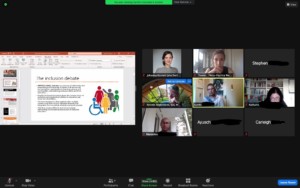 an conflict or the question of medically assisted suicide) and dissecting their discursive undercurrents and positionalities than questions of fault and blame. The trust and respect displayed by all participants in this delicate session underlined the trust relationships that were built in the course of the programme year, making a frank and empathetic discussion of these issues possible in the first place. This is also a result of the monthly check-in sessions that were initiated in this programme year.
an conflict or the question of medically assisted suicide) and dissecting their discursive undercurrents and positionalities than questions of fault and blame. The trust and respect displayed by all participants in this delicate session underlined the trust relationships that were built in the course of the programme year, making a frank and empathetic discussion of these issues possible in the first place. This is also a result of the monthly check-in sessions that were initiated in this programme year.
Friday noon is generally the opportunity for our Muslim participants to share their Friday prayer insights (Djumma Mubarak) with us: in an interactive and musically inspiring and stimulating session, our participants Rukkayah and Nurenisa Reichling, Hicham Rhannan and Mai Anwar shared their approaches to the holiest prayer of the Muslim 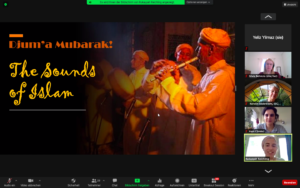 week, while introducing the participants to different branches and practices of the Muslim faith, especially in the realm of music.
week, while introducing the participants to different branches and practices of the Muslim faith, especially in the realm of music.
The afternoon was spent in an informal, yet reflective atmosphere, bringing the team members together with participants in small breakout rooms in order to discuss the takeaways from this programme year. Expectations were contrasted with the experiences of the year and participants had the chance to voice their wishes and criticisms in a safe space with team members.
Traditionally, the Friday evening is the space for the Shabbat service with and from our Jewish participants in cooperation with Rabbi Maximilian Feldhake. Josephine Davidoff, David Bakum and Helene Shani Braun introduced the participants to meaningful parts of their Shabbat ritual, followed by a joint reflection by Rabbi Feldhake and the Jewish participants on the manifold aspects of Shabbat service in the respective Jewish denominations across the world.
After two intense days, the participants were entitled to a screen free Shabbat (19 June), albeit offering the participants the opportunity to get together informally with the team members in the afternoon to discuss issues pertaining to this as well as next year’s programme at DialoguePerspectives. The evening gave us the opportunity to enjoy a #socialsaturday with num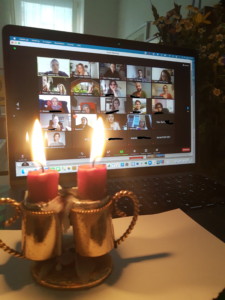 erous alumni*ae of the programme, who made the time to offer the current participants insights into their most important experiences within the programme as well as into their current organizational and professional work. The alumni*ae work is a testament to the fact that DialoguePerspectives fosters long lasting connections between participants beyond the events of the programme.
erous alumni*ae of the programme, who made the time to offer the current participants insights into their most important experiences within the programme as well as into their current organizational and professional work. The alumni*ae work is a testament to the fact that DialoguePerspectives fosters long lasting connections between participants beyond the events of the programme.
Our last conference day (20 June) was opened by an ecumenical service, led by Dr. Kerstin Söderblom, in cooperation with our participants Anna Czamara and Lorenz Hegeler. The three of them highlighted the challenges of the still ongoing pandemic as well as the power of belief in the strive for solidarity and care in a fragmented European society. The final session gave the participants as well as the team to reflect on this turbulent and intense programme year. One participant stated that the work with the DialoguePerspectives 2020/21 cohort felt like “family, home and connection” whereas other participants underlined the de-stereotyping effect of the programme, as it challenges each and every participant to put his/her/their own positions and predicaments into perspective.
We look forward to continuing the discussion in our next programme year – the call for applications will be published in early July. Stay tuned, share and apply!
